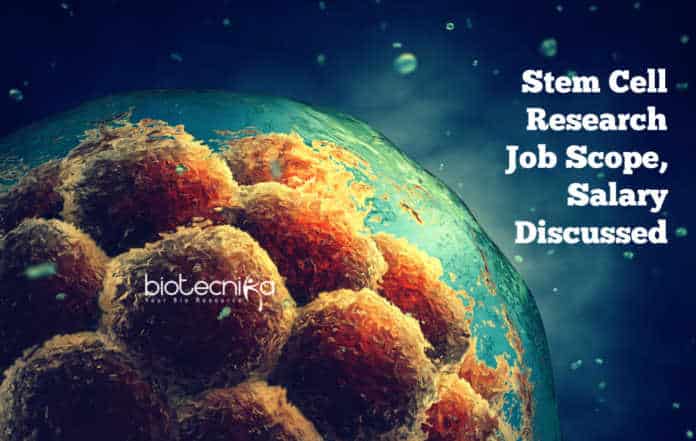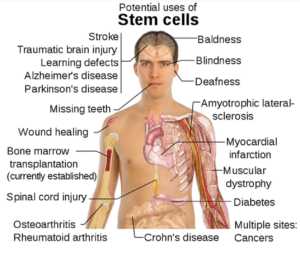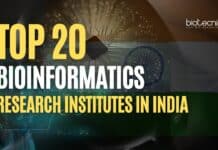Career In Stem Cell Research
The discovery of Sir John B. Gurdon and Shinya Yamanaka in the field of biology has revolutionized the world of medicine. For the discovery of mature cells that can be reprogrammed to become pluripotent, Gurdon and Yamanaka jointly received the Nobel Prize in Physiology or Medicine 2012. Ever since stem cell culture and stem cell therapy has come of great interest. The idea has already been exploited in different countries. India is not behind. India’s first stem cell trial took place in Bangalore, under a Bangalore-based company, Stempeutics Research. Stem Cell therapy has uplifted and firmly positioned India in the international platform of medical science.
Stem Cell therapy has changed the medical perception of various incurable neurological disorders and this therapy has broken all boundaries. As for now only blood stem cells from bone marrow to treat blood cancers and different blood disorders are permitted. Though stem cell therapies are being touted as a panacea for all ills, but at this point in time, only the blood-forming (hematopoietic) stem cells from bone marrow or umbilical (Nadi) cord blood are routinely used to treat blood cancers and different blood disorders which are known as the Bone
Marrow Transplant (BMT) or Hematopoietic Stem Cell Transplant (HSCT). For other diseases, studies are being conducted to find out if stem cells can be helpful in curing these diseases. This has opened many new avenues for our group of young scientists to fulfill their dream in stem cell research.So before exploring the research world related to stem cells, let us first understand what is a stem cell, and its different uses.
Stem Cells, What are they?
Stem cells found in multicellular microorganisms are those cells that have the capability to develop into various cells. In numerous tissues, stem cells serve as a type of internal repair system which essentially divides indefinitely to replenish various other cells as long as the organism is still alive.
On dividing, each new stem cell can become another type of cell with a more specialized function or remain as stem cell, e.g. a red blood cell, a muscle cell, a nerve cell, a cardiomyocyte (heart muscle cell) or a brain cell. There are two important characteristics in stem cells for which they stand out from another cell type- Firstly, they are unspecialized cells and even after long periods of inactivity are capable of renewing themselves through cell division. Secondly, stem cells can be induced to become tissue-specific or organ-specific cells with special functions only under certain physiologic or experimental conditions.
In organs such as bone marrow and gut, stem cells divide regularly to replace and repair any damaged tissues unlike in heart and pancreas, stem cells divide only under specific conditions. The source of adult stem cells in bone marrow, blood, and adipose tissues. Stem cells can likewise be collected from umbilical cable blood. Stem cells are understood to be a wonder of modern medication as well as these cells have developed to a new age of therapeutic techniques like Stem Cell Therapy.
A variety of stem cells are being used from diverse origins or sources. In India, there are 3 types of stem cells that are generally used for stem cell therapy. They are:
- Umbilical cord stem cells
- Adult stem cells
- embryonic stem cells
In India, areas, where the stem cell therapy can be an effective treatment, are Chronic Kidney Diseases, COPD and other Lung Disorders, Neurological conditions, Orthopaedics, Cardiology, Autoimmune disorders, Ophthalmic diseases, Liver Diseases, Infertility, & Cosmetic Procedures.
Stem cell therapy has the potential to treat serious ailments like Type-1 Diabetes Mellitus, Parkinson’s disease, Rheumatoid Arthritis & various types of cancers.
The stem cell research field has become one of the most viable fields offering exciting career options. Researchers grow stem cells in-vitro. These cells have the capacity to be manipulated to specialize in specific types of cells like blood cells, heart muscle cells or even the nerve cells. Stem cells, the specialized cells, can be implanted in a person. For example, a person with heart disease can be cured by injecting the cells into his/her heart muscle. The healthy transplanted heart cells would then repair the defective heart muscles.
So as you can see, there are plenty of opportunities in this area of bioscience. Experts like Bill Gates and Mark Zuckerberg say that Biosciences are going to be among the top 3 career paths along with Artificial Intelligence and related technologies like the Internet of Things aka IoT & Robotics, Machine Learning, etc.) and Renewable Energy.
However, people are still very skeptical about career opportunities in biosciences and biomedical science & engineering. It is true that the research scopes in India are quite limited due to various factors like lack of innovative mindset, insufficient funding and most importantly lack proper infrastructure. Still, in recent years, fields like regenerative medicine, stem cell therapy, and tissue engineering, have caught the interest of the Government and Industry, including the VC firms. The VC funding in companies active in regenerative medicine has increased to $807 million in 2016 (Goldman Sachs) from $296 million in 2011. Stem cell banks are getting flourished across India. There are several Indian start-up companies working in the field of stem cells and regenerative medicine very actively.
Some of the companies are:
- Stempeutics (Bengaluru),
- Advancells (Noida)
- Transcell Biologics (Hyderabad),
- Pandorum Technologies (Bengaluru).
Advancells, Noida won the Best Stem Cell Technology Research and Development Company in the year 2017.
How to Make a Successful Career In Stem Cell Research?
- The eligibility to make a career in stem cell research domain is not restricted to only medical professionals.
- Candidates holding a postgraduate degree in regenerative medicine or a basic degree in Biology, B.Sc graduates with at least one subject from the biological sciences, MBBS, B.Pharma, B.D.S., B.V.Sc. or B.E. Biotechnology graduates can also find jobs in this field.
- One can study B.Sc., B.Pharma., MBBS, B.E. (Biotechnology or Biomedical Engineering), BVSc, BDS, at the bachelor’s level.
- At Masters Level, it is better to go with Biochemistry, Genetics, Biotechnology, Microbiology, Molecular Medicine, Zoology, Biophysics, Developmental Biology, Translational Medicine. Stem Cell Biology, Biomedical Sciences or Life Sciences.
- There is also an option available for MSc. in Regenerative Medicine e.g. MIRM Bengaluru in India, or abroad.
- Some of the countries with the most interesting developments in stem cell research are Australia, Europe, and the U.K.
There are several institutes in India researching newer therapies based on experiential studies on the effects of stem cells in different biological realms.
Institutes that provide courses on Regenerative medicine in India are:
- IISc Bengaluru
- IIT Madras
- National Institute of Immunology Delhi
- IISER Mohali
- AIIMS Delhi
- NCBS Bengaluru
- NCCS Pune
- NIRRH Mumbai
- MIRM Bengaluru
- CCMB Hyderabad
What are the roles and responsibilities of a stem cell research scientist?
When it comes to the roles and responsibilities of a stem cell research scientist, it is the work of stem cell research scientist is to grow stem cells in a laboratory, manipulate these cells to become specialised in specific types of cells, such as blood cells, heart muscle cells or nerve cells and then finally implanting the cells in a person. For instance, stem cells can be injected into the heart muscle of a person suffering from heart disease and the transplanted heart cells can help in repairing the defective heart muscle.
Researchers working in the field of stem cell research take up their duties of covering several emerging aspects of stem cells including embryonic stem cells, developmental studies, stem cell genomes, tissue-specific stem cells, and cancer stem cells.
Stem Cell Research Job Prospects in India:
Although stem cell research is still at a nascent stage in India, by the year 2018 this therapy market in India is expecting a tremendous growth worth INR 2 billion which will lead to an increase in the number of stem cell depositors and stem cell banks in the near future, which was unheard of a few years ago. This is all made possible with the liberalization of stem cell research, and also with the increased government support and funds.
By the year 2016, the global market is expected to touch about USD 40 billion. This emerging branch of regenerative medicine thus calls for quality, skilled and trained personnel, thereby opening up excellent career opportunities for post-graduate students from diverse scientific fields.
Why is this a good time for biomedical research careers?
India is one of the major biotech players in the Asia Pacific region. India, sharing the dais with Japan and South Korea, has recently secured an investment of about INR 1000 crores. This opens up new possibilities that gives the students some promising opportunities to pursue their research careers in developmental biology, embryology, molecular biology, nanotechnology, clinical research, cell biology, medical biotech, tissue engineering, and stem cell biology and even multiple options to pursue higher studies and career options in applicative translational field and also basic biology.
Job opportunity in stem cell research
Students can begin their career journey in this field with quality, production, clinical research, Research and Development, supply chain and human resources besides finance and other administrative functions.
What is the starting salary in stem cell research:
An eligible post-graduate can start his/her career in the stem cell research field with INR 30,000 per month and can earn more than INR 50,000 per month after obtaining a Ph.D. Postdoctoral fellows can earn around USD 35,000 to 40,000 or Euro 25,000 to 30,000 annually. This is what makes stem cell research career more profitable.
The potential and future possibilities of stem cells are tremendous. This advances in area science and research has become one of the most rewarding areas of research. Although it might take many years to completely recognize its potential to improve the treatment of the most obdurate diseases, this research field can be considered as one of the brightest areas in the fields of medicine and biology. Stem Cell Research will ensure a promising academic career ahead with lots of possibilities.
Stem cell research carries the hope of the future modern medicine which is driven by the possibility to cure a vast array of diseases and medical conditions. For those who are willing to take on challenges, stem cell research is a promising field that shows all the signs of emerging as one of the most sustainable career options.
 is a senior – experienced faculty at BioTecNika. She has a specialization in botany, cell biology, and plant tissue culture. Being one of the most popular educators at Biotecnika, she keeps her students updated with the latest developments in the field of science. She also has a keen interest in the field of Biodiversity.
is a senior – experienced faculty at BioTecNika. She has a specialization in botany, cell biology, and plant tissue culture. Being one of the most popular educators at Biotecnika, she keeps her students updated with the latest developments in the field of science. She also has a keen interest in the field of Biodiversity. 







































Can you write a similar article for Embryology in India and working with ART?